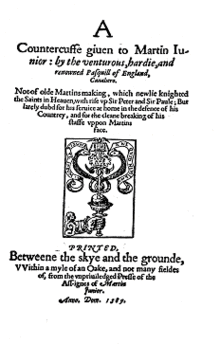Pasquill (the Cavaliero)

Pasquill ("the renowned Cavaliero") is the pseudonym adopted by a defender of the Anglican hierarchy in an English political and theological controversy of the 1580s known as the "Marprelate controversy" after "Martin Marprelate", the nom de plume of a Puritan critic of the Anglican establishment. The names of Pasquill and his friend "Marforius", with whom he has a dialogue in the second of the tracts issued in his name, are derived from those of "Pasquino" (in Latin Pasquillus) and "Marforio", the two most famous of the talking statues of Rome, where from the early 16th century on it was customary to paste up anonymous notes or verses commenting on current affairs and scandals.
Tracts
Three tracts critical of Martin Marprelate were issued under the name of Pasquill in 1589 and 1590:
- A Countercuffe Given to Martin Junior (1600 words), dated Aug 6 or 8, 1589 "from Gravesend Barge" – a customary point of departure from London to the Continent or Mediterranean
- The Return of Pasquill (otherwise Pasquill and Marforius) (9600 words) with a postscript "from London Stone" dated Oct 20, 1589
- The First Part of Pasquill's Apology (8300 words), dated July 2, 1590
Attribution
Traditionally the three tracts have been attributed to Thomas Nashe. However, Roland McKerrow, the leading Nashe scholar of the early 20th century, expressed strong doubts about the attribution. Though he included the tracts in his definitive Collected Works of Thomas Nashe, he conceded not only that "external evidence of Nashe's authorship...is of the vaguest" but that "against the attribution, there is internal evidence which seems to me to be of far more weight than the external evidence for it." [1] Notwithstanding these remarks by McKerrow, authoritative reference sources such as Early English Books Online and the Short Title Catalog still attribute the works to Nashe.
Another possible author is Anthony Munday, who, like Nashe, was apparently active as an anti-Martinist agent. This attribution has not received widespread support.[2]
References
Further reading
- Black, Joseph Laurence (2008). The Martin Marprelate tracts: a modernized and annotated edition. Cambridge University Press.
- Carlson, Leland H. (1981). Martin Marprelate, gentleman : Master Job Throkmorton laid open in his colors. San Marino, California: Huntington Library.